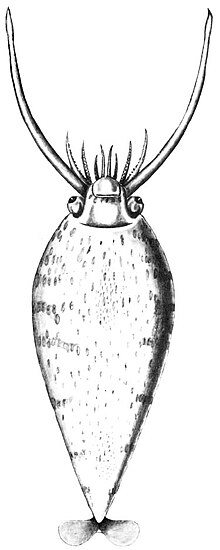|
Helicocranchia pfefferi
Helicocranchia pfefferi, the banded piglet squid, is a small squid of the genus Helicocranchia. Adults of this species are mesopelagic. Physical characteristicsThe average size of adult H. pfefferi is 100 mm (3.9 in) in mantle length (ML). The body consists of a large funnel with small paddle-like fins. They have small tentacles above their eyes. The funnel does not have valves, but contains a dorsal pad with three papillae as organs.[citation needed] Paddle-shaped fins are attached to a part of the gladius. H. pfefferi has a single ocular photophore and does not have photophores at its arm tips. HabitatAs paralarvae (<30 mm ML), they live near the surface of the oceans, between 100 m and 200 m deep. They descend to the mesopelagic zone as they mature, but exhibit a diel vertical migration pattern.[3] References
PreyIts diet resembles that of most squid: fish, shrimp, and squid.
External linksWikimedia Commons has media related to Helicocranchia pfefferi.
|
||||||||||||||||||||||||||||||||||||||

